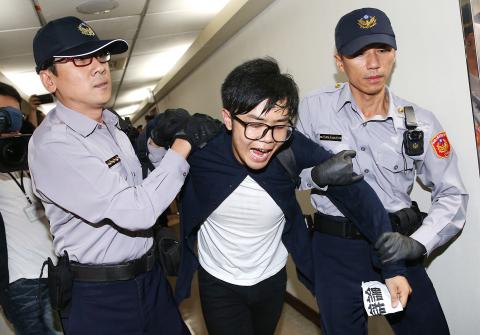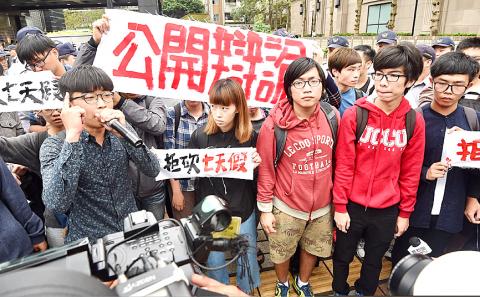A dozen students yesterday stormed the legislative office of Democratic Progressive Party (DPP) caucus whip Ker Chien-ming (柯建銘) to protest the party’s plans to cancel seven national holidays.
Members of the Taiwan Higher Education Union and Labor Struggle, a coalition of unions and student groups, occupied Ker’s office in an annex of the Legislative Yuan in Taipei ahead of a cross-party negotiation to discuss a draft amendment to the Labor Standards Act (勞動基準法) proposed by the DPP, which would reduce the number of public holidays from 19 to 12 and implement a five-day workweek with one mandatory day off and one “flexible rest day.”
The protesters demanded a public debate with Ker and called on the DPP to withdraw the bill.

Photo: CNA
Police evicted them after a 30-minute standoff and the protesters later held a news conference.
The protest was directed against Ker because of his role in the party’s negotiations with interest groups, particularly two “secret meetings” with corporate representatives in June and another meeting in August, the protesters said.
They criticized the DPP for rushing the bill through two legislative sessions on Oct. 5 and on Thursday last week, with even DPP legislators who profess to have progressive values mobilized to bulldoze it through, Labor Struggle member Cheng Chung-hao (鄭仲皓) said.

Photo: Peter Lo, Taipei Times
“The DPP administration claims that it is on the side of workers, but it held secret meetings with business leaders. What about the workers? Where is the promised communication?” Cheng said. “The DPP is basically the ‘capitalist’ progressive party.”
Ker said that the DPP had included a set of supporting measures in the bill and the legislation would be debated and negotiated according to due process.
“It is legislators with whom I should engage in a debate,” Ker said, brushing aside the protesters’ demands. “The legislature has its own rules.”
Legislative Speaker Su Jia-chyuan (蘇嘉全) denounced the protesters’ actions, saying they jeopardized the safety of legislators and legislative staffers.
Su drafted a legislative statement of condemnation, but the Chinese Nationalist Party (KMT) caucus refused to endorse it.
DPP caucus chief executive Wu Ping-jui (吳秉叡) said the protest was unacceptable, as legislators’ offices are private and that protesters might start occupying the homes of legislators if they fail to distinguish between public and private spaces.
KMT Legislator Lee Yan-hsiu (李彥秀) said the DPP had vowed to communicate with the public on major policies, but it has fueled social division by trying to force the bill through a divided legislature.
Lee asked Su to remain impartial when chairing cross-party negotiations or the opposition parties would launch an all-out boycott of the DPP’s bills.

The CIA has a message for Chinese government officials worried about their place in Chinese President Xi Jinping’s (習近平) government: Come work with us. The agency released two Mandarin-language videos on social media on Thursday inviting disgruntled officials to contact the CIA. The recruitment videos posted on YouTube and X racked up more than 5 million views combined in their first day. The outreach comes as CIA Director John Ratcliffe has vowed to boost the agency’s use of intelligence from human sources and its focus on China, which has recently targeted US officials with its own espionage operations. The videos are “aimed at

STEADFAST FRIEND: The bills encourage increased Taiwan-US engagement and address China’s distortion of UN Resolution 2758 to isolate Taiwan internationally The Presidential Office yesterday thanked the US House of Representatives for unanimously passing two Taiwan-related bills highlighting its solid support for Taiwan’s democracy and global participation, and for deepening bilateral relations. One of the bills, the Taiwan Assurance Implementation Act, requires the US Department of State to periodically review its guidelines for engagement with Taiwan, and report to the US Congress on the guidelines and plans to lift self-imposed limitations on US-Taiwan engagement. The other bill is the Taiwan International Solidarity Act, which clarifies that UN Resolution 2758 does not address the issue of the representation of Taiwan or its people in

SHIFT: Taiwan’s better-than-expected first-quarter GDP and signs of weakness in the US have driven global capital back to emerging markets, the central bank head said The central bank yesterday blamed market speculation for the steep rise in the local currency, and urged exporters and financial institutions to stay calm and stop panic sell-offs to avoid hurting their own profitability. The nation’s top monetary policymaker said that it would step in, if necessary, to maintain order and stability in the foreign exchange market. The remarks came as the NT dollar yesterday closed up NT$0.919 to NT$30.145 against the US dollar in Taipei trading, after rising as high as NT$29.59 in intraday trading. The local currency has surged 5.85 percent against the greenback over the past two sessions, central

US Indo-Pacific Commander Admiral Samuel Paparo on Friday expressed concern over the rate at which China is diversifying its military exercises, the Financial Times (FT) reported on Saturday. “The rates of change on the depth and breadth of their exercises is the one non-linear effect that I’ve seen in the last year that wakes me up at night or keeps me up at night,” Paparo was quoted by FT as saying while attending the annual Sedona Forum at the McCain Institute in Arizona. Paparo also expressed concern over the speed with which China was expanding its military. While the US